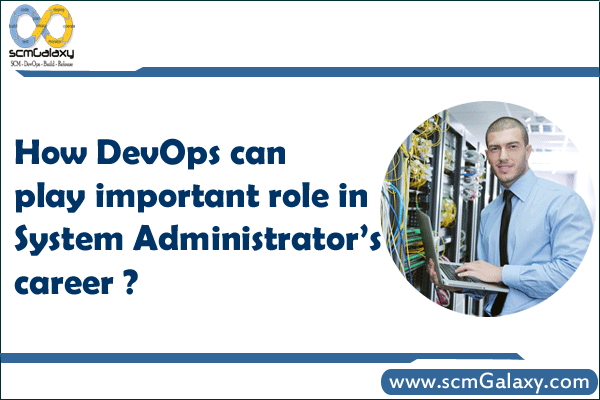

DevOps is merging the path between Developers and Operations teams. It’s all about the agility and automation. Servers, in DevOps easily can be replaced instead of keeping it and nurture it. Everyone knows that the basic role of System Administrator to Configuring, Debugging and Troubleshooting.
They build their career in DevOps, where they have to configure and troubleshoot individual servers those have roles to play in the work space. With that they should learn to apply their skills to entire IT infrastructure described and managed by code. They should learn to manage cloud service and use automated deployment tools and code repositories. Also, they must learn to focus on the infrastructure they can control because in the cloud they usually won’t have access to or information about the underlying hardware, storage or networks. So a System Administrator should learn existing skills and new tools.
Everyone knows scripting is used to automate repetitive or error prone tasks which is a key practice in DevOps. Learning a programming language will help them create more robust scripts like Python or Perl. “Anyone with basic shell scripting experience can pick them up pretty easily.” Says Bobby Smith, Director of Research and Development.
Though most DevOps System runs in the cloud, learning the management interfaces to Infrastructure service offerings such as Amazon Web Service (AWS ) or Microsoft Azure is valuable.
Most important, knowledge of Configuration management tools such as puppet and chef can help system administrators automate the large scale system provisioning that is central to DevOps. Understand the language on which such tools are built such as Ruby, makes it easier to extend their use to an organizations need.
Inventory Management Tools, help system administrator identify the resources they need to manage in fast changing cloud environment.
For Performance monitoring, he recommends tools such as Nagios or Amazon , along with log aggregation products such as Logstash and Flume. Combined with cloud service, it’s impossible to create systems of metrics to understand how your infrastructure is doing.
The very next step is combining build management tools with continuous integration platforms. This will help system administrators provide agility promised by DevOps. Also, you can learn version control that holds the code that describes enterprise infrastructures.
If you may see developers create applications without a whole lot expertise of the infrastructure on which they ought to run. Now, your price isn’t just what I’m able to do, but how I help others, and the way am I able to help align with the organization’s dreams and targets. So For System Administrators, DevOps doesn’t make their specialized talents out of date. Instead, he says, it may deliver them “first rate powers” to make those competencies even extra vital to the enterprise.
I’m a DevOps/SRE/DevSecOps/Cloud Expert passionate about sharing knowledge and experiences. I am working at Cotocus. I blog tech insights at DevOps School, travel stories at Holiday Landmark, stock market tips at Stocks Mantra, health and fitness guidance at My Medic Plus, product reviews at I reviewed , and SEO strategies at Wizbrand.
Please find my social handles as below;
Rajesh Kumar Personal Website
Rajesh Kumar at YOUTUBE
Rajesh Kumar at INSTAGRAM
Rajesh Kumar at X
Rajesh Kumar at FACEBOOK
Rajesh Kumar at LINKEDIN
Rajesh Kumar at PINTEREST
Rajesh Kumar at QUORA
Rajesh Kumar at WIZBRAND

